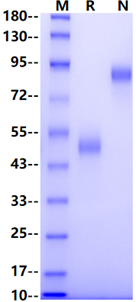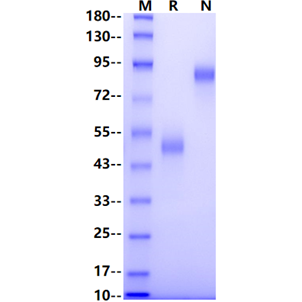Product Details
Product Details
Product Specification
| Species | Mouse |
| Synonyms | BAFFR, BR3, CD268, TNFRSF13C |
| Accession | Q9D8D0 |
| Amino Acid Sequence | Ser10-Ala71, with C-terminal Human IgG Fc SQRSRDSSVPTQCNQTECFDPLVRNCVSCELFHTPDTGHTSSLEPGTALQPQEGSALRPDVADIEGRMDPKSSDKTHTCPPCPAPELLGGPSVFLFPPKPKDTLMISRTPEVTCVVVDVSHEDPEVKFNWYVDGVEVHNAKTKPREEQYNSTYRVVSVLTVLHQDWLNGKEYKCKVSNKALPAPIEKTISKAKGQPREPQVYTLPPSRDELTKNQVSLTCLVKGFYPSDIAVEWESNGQPENNYKTTPPVLDSDGSFFLYSKLTVDKSRWQQGNVFSCSVMHEALHNHYTQKSLSLSPGK |
| Expression System | HEK293 |
| Molecular Weight | 45-50kDa |
| Purity | >95% by SDS-PAGE |
| Endotoxin | <0.1EU/μg |
| Conjugation | Unconjugated |
| Physical Appearance | Lyophilized Powder |
| Storage Buffer | PBS, pH7.4 |
| Reconstitution | Reconstitute at 0.1-1 mg/ml according to the size in ultrapure water after rapid centrifugation. |
| Stability & Storage | · 12 months from date of receipt, lyophilized powder stored at -20 to -80℃. · 3 months, -20 to -80℃ under sterile conditions after reconstitution. · 1 week, 2 to 8℃ under sterile conditions after reconstitution. · Please avoid repeated freeze-thaw cycles. |
| Reference |
1、Losi C G. et al. (2005) Mutational analysis of human BAFF receptor TNFRSF13C (BAFF-R) in patients with common variable immunodeficiency. J Clin Immunol. 25(5): 496-502. 2、Hentges K E. et al. (2002) Tnfrsf13c (Baffr) is mis-expressed in tumors with murine leukemia virus insertions at Lvis22. Genomics. 80(2): 204-12. |
Background
Tumor necrosis factor receptor superfamily, member 13C (TNFRSF13C) also known as B-cell-activating factor receptor (BAFFR) and CD268 antigen, is a member of the tumor necrosis factor receptor superfamily. The TNF superfamily ligand BAFF maintains the survival of naive B cells by signaling through its surface receptor, BAFFR. Activated B cells maintain expression of BAFFR after they differentiate into germinal center (GC) or memory B cells (MBCs). However, the functions of BAFFR in these antigen-experienced B cell populations remain unclear. Here, we show that B cell–intrinsic BAFFR does not play a significant role in the survival or function of GC B cells or in the generation of the somatically mutated MBCs derived from them. Instead, BAFF/BAFFR signaling was required to generate the unmutated, GC-independent MBCs that differentiate directly from activated B cell blasts early in the response.
Picture
Picture
SDS-PAGE

1μg (R: reducing condition, N: non-reducing condition).


